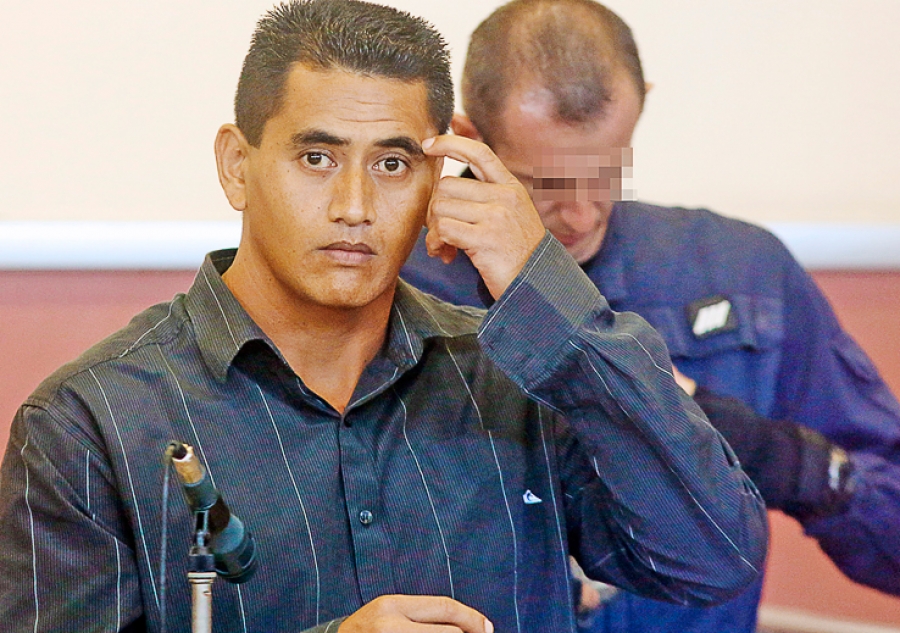
Marquesan Henri Haiti has been sentenced to a minimum of 18 years in jail for the murder of German traveller Stephen Ramin and the sexual assault of the German man's partner Heike Dorsch on Nuku Hiva.
Marquesan man ‘Henri’ Arihano Haiti has been found guilty of the murder of a German tourist on Nuku Hiva in 2011 and sentenced to a minimum of 18 years in prison.
After a trial lasting four days, Haiti was convicted and sentenced to 28 years imprisonment, with parole only after 18 years, for the murder of German yachtmsan Stefan Ramin and the kidnapping and sexual assault of his crew and girlfriend Heike Dorsch in October 2011.
Haiti was arrested after he gave himself up after 50 days on the run following the world-headline-making incident in French Polynesia’s remote Marquesas islands.
The court heard that Haiti had killed the 40-year-old who was on a round-the-world trip with his partner Dorsch, 37, some weeks after they arrived in the Marquesas Polynesia in September 2011.
Haiti had befriended the couple and offered to take Ramin, a man of adventure, on a wild goat hunt at a remote Nuku Hiva location which they accessed in the German couple’s yacht.
Haiti did not deny shooting and killing Ramin but said he did so because the German man had sexually assaulted him.
Haiti claimed in his defence that Ramin had plied him with drug-laced rum before attempting to sodomise him. But investigators found no evidence to support his claim.
Haiti said he killed Ramin and later sexually assaulted Dorsch as an “act of revenge”.
A small bottle of rum was found near the murder scene and an analysis of its contents later revealed that it was free of any substance other than rum.
Detectives in Germany, working together with the local investigators, say a survey carried out of Ramin’s family, friends and professional colleagues had established unequivocally that Ramin had no tendencies that might have led him to want to sexually abuse the younger Marquesan man.
This was backed up by investigators who pointed out that the hunter was physically far bigger and stronger than the German man.
The jury of six was asked to consider how Haiti, a fit young man of 95kg, could have been subdued and raped by an older man some 20kg lighter.
In addition, a physical examination of Haiti after he was arrested had shown no indication that he had suffered any sexual assault.
Investigations carried out on the personality of Haiti have revealed a tendency to violence, the volatility of his temperament and his attraction to transvestites.
A lawyer for the dead man’s family, Yves Pirou, said that the accused’s allegations of homosexuality on behalf of Ramin were “a work of fiction”.
He said the reality was exactly the opposite and he alleged that Haiti was known to have had regular contact with transvestites and the probability was far more likely that the Marquesan hunter had raped the tourist or at least tried to rape him.
The prosecution alleged that Haiti shot Ramin in the head with his hunting rifle before chopping his body to pieces and burning it in a fire during the goat hunting expedition.
The court heard he then went back to the boat, which was anchored offshore, where he lured Ramin’s partner Dorsch ashore and into the jungle, telling her that Ramin had been injured in an accident.
However, the court was told that she became suspicious and wanted to return to the yacht to call the authorities by radio.
It is then that he is alleged to have tied her to a tree and sexually assaulted.
“One minute everything was peaceful, and the next minute he turned around, pointing the gun at me. I stared at the barrel and I thought, ‘now I am going to die’," Dorsch earlier told German newspaper Bild.
She said Haiti tried to rape her after he tied her to a tree, but he then abandoned her and she managed to set herself free and was able to swim out to another anchored yacht to raise the alarm.
Haiti’s lawyer Vincent Dubois said that the Marquesan man was not a monster and argued that it was clear something went wrong on the trip to the mountain.
At the time of the incident – after Ramin’s remains were found in an old fire pit – it was reported that Haiti had eaten Ramin, but investigators told the trial that they had been unable to establish if this was true or not.
Throughout the trial, international media, mainly in Germany, have explored the theory of cannibalism.
The chief prosecutor sought to definitely eliminate the possibility of an act of cannibalism, refusing “to even mention the word again”.














































